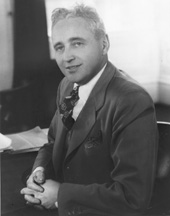Ernest Gibson Junior
Ernest William Gibson Jr. (born March 6, 1901 in Brattleboro , Vermont , † November 4, 1969 ibid) was an American politician and governor of Vermont from 1947 to 1950 . He also represented this state in the US Senate between 1940 and 1941 .
Early years and political advancement
Ernest Gibson Jr. was the son of Ernest Gibson Sr. , who was a Senator for Vermont in the US Congress between 1933 and 1940 . The younger Gibson attended public schools in his home country and graduated from Norwich University in 1923 . After studying law at George Washington University , he was admitted to the bar in 1926. Then he practiced in his new profession in Brattleboro. While studying law, he also taught at the New York Military Academy in Cornwall . Between 1929 and 1933 he was a district attorney in Windham County . From 1931 to 1940 he was employed in the administration of the State Senate ; in 1939 and 1940 he was also a member of the Railroad Tax Commission .
US Senator and Governor of Vermont
Ernest Gibson was a member of the Republican Party . After his father died in 1940 while serving as the US Senator, he was appointed as his interim successor as a Class 3 Senator . He held this office between June 24, 1940 and January 3, 1941. On that day, George Aiken , who had been officially elected Senator, took over this mandate, which he would keep until 1975 after several re-elections. Ernest Gibson Jr. never ran for a seat in Congress himself.
During the Second World War Gibson was used as a colonel in a reserve unit in the South Pacific. In 1947 he was elected as his party's candidate for governor of his state. In the primaries, incumbent Mortimer R. Proctor suggested . Gibson took up his new office on January 9, 1947. Two years later he was confirmed by Vermont voters. Gibson campaigned for numerous social and economic reforms, particularly in health care and education policy. At that time, the state's police force was also restructured and some government agencies restructured. After he was appointed by US President Harry S. Truman as a judge at the federal district court for the Vermont district, Gibson resigned from the office of governor on January 16, 1950 and Lieutenant Governor Harold J. Arthur had to end his beginning term.
Another résumé
Ernest Gibson served as federal judge until his death in 1969. He was married twice and had four children in total. His son Ernest served in World War II and was also active as a judge and politician in Vermont.
Web links
- Ernest Gibson in the Governors Association (English)
- Ernest Gibson in the Biographical Directory of the United States Congress (English)
- Ernest Gibson junior in the database of Find a Grave (English)
| personal data | |
|---|---|
| SURNAME | Gibson, Ernest Jr. |
| ALTERNATIVE NAMES | Gibson, Ernest William Jr. |
| BRIEF DESCRIPTION | American politician |
| DATE OF BIRTH | March 6, 1901 |
| PLACE OF BIRTH | Brattleboro , Vermont |
| DATE OF DEATH | 4th November 1969 |
| Place of death | Brattleboro , Vermont |


